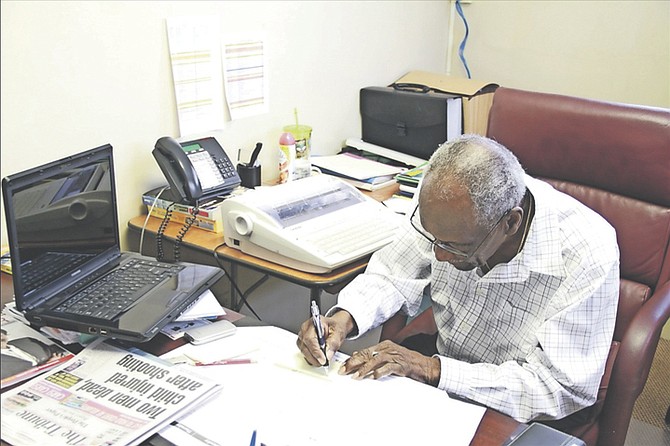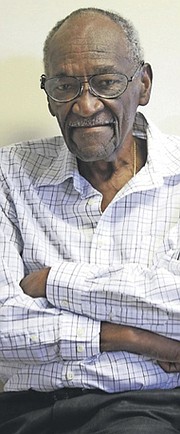Paul Thompson came to the Bahamas in 1951 and remains optimistic the issues of crime plaguing the country today can be solved. Photo: Tim Clarke
Administrative fraud and selective policing are causes of real concern in the Bahamas, says former assistant Police Commissioner Paul Thompson
The words discipline, supervision, enforcement, accountability and transparency appear to be absent from the minds of our present-day public servants.
Stories appearing in the media in recent years demonstrate so many incidents of irresponsibility, gross negligence and possible criminal activity, that we seem to be undergoing a massive deterioration in the performance of the Civil Service.
Media reports have revealed that citizens and businesses owe hundreds of millions of dollars in taxes - including property tax, casino tax, business licence fees, Customs fees, electricity and telephone services and National Insurance contributions.
The government’s student loan programme was cancelled due to millions of dollars in outstanding repayments. We were told that public servants responsible for collecting the repayments had not done so for years.
Reports of poor construction in the government’s low-cost housing estates was supposed to have set a police investigation in motion, as additional tax dollars had to be spent to carry out necessary repairs.
Paul Thompson is the quintessential policeman. His career spanned the modern development of The Bahamas - from colonial times to the challenges of nationhood.
Born in a small farming village in Trinidad, he was recruited by the Royal Bahamas Police Force in 1951. He spent most of his time on the force in the Criminal Investigation Department, retiring in 1981 as an Assistant Commissioner.
He then began a second career as head of security for the Paradise Island Resort & Casino, returning to the police force as a civilian training officer in 1998, and in 2002 was appointed general manager of Wemco Security.
Five years later, he set up his own security company - Paul Thompson & Associates. Now in his 80s, he remains active in security work.
The police were to determine if there was a criminal conspiracy between contractors and building inspectors. But no reports were forthcoming on the outcome of the investigations.
A Family Island Customs officer allegedly redeemed cheques made payable to himself for duty payments. Reportedly, huge sums of money were collected in this way until the practice was finally stopped and the officer forced to resign - with a nice financial package. But there were no reports of any criminal investigation.
A few years ago there were reports that contractors had embezzled over $1 million from government through its solid waste programme in the Family Islands. The public servants who were responsible for ensuring that the work was properly carried out before payments were made to the contractors apparently failed to do their job.
It was also reported that over $500,000 was paid by the government for work that was never completed. Surely public servants should have been checking to confirm the completion of this work?
There have been reports about criminal misconduct in several government ministries, but the incidents were apparently not communicated to the police for investigation by senior officials.
The rise in white-collar crime in government departments has become a major issue for the nation. And it is made worse by the failure of those in authority to report such matters to the police or to prosecute the offenders. This obvious lack of accountability has resulted in even more abuses.
Those in authority seem to prefer to deal with thieves administratively and even allow many to return to work following a brief suspension.
We should all be concerned about the apparent inefficiency and irresponsibility of our public service. It involves the massive loss of tax revenue due to gross negligence and theft. Civil servants are responsible for the administration of government policies, rules and regulations, and they should have no reason to fear any politician in the proper execution of their duties.
Many years ago, two senior public servants lost their jobs and pensions. One died shortly thereafter and the other lost his mind and became a vagrant on the streets. Both of these men helped their political bosses acquire cash and services to which they were not entitled. In one case the civil servant co-signed department cheques for funds requested by his political boss. In the other case the civil servant allowed his political boss to use a departmental credit card for personal expenses - including gaming costs in foreign casinos.
Both political bosses were charged with criminal offences, but the Attorney General’s office declined to prosecute, even though we had the documentary evidence. The politicians were removed from their positions and both public servants lost their jobs and pensions.
Nothing discourages and disheartens police officers more than knowing that their efforts in fighting crime are useless - because of unwarranted interference or leniency by political authorities.
The incidents of which I speak were investigated by me over several weeks and long hours. Colleagues from overseas who assisted in these cases were shocked by the Nolle Prosequi (no prosecution) order.
When vice and corruption on this scale is treated so lightly, it is not difficult to understand why criminals do not fear the consequences of their actions.
As Federal Bureau of Investigation Director J Edgar Hoover once said: criminals who prey on honest men and still escape punishment are encouraged in their disdain for the law and will go on to commit more serious depredations.
More recently, there have been serious concerns raised about selective policing in the Bahamas. Published reports of theft and fraud in government departments have not led to prompt referrals to the police. And delays in taking action have enabled those involved to hide or destroy evidence.
In the past such complaints were made promptly to the police by the department heads themselves - and not sometime after the fact by politicians.
There have also been published reports of the arrest of relatives of prominent citizens for firearms and drug possession, but these arrests never resulted in any charges before the courts.
During my early years as a police officer, the names of those arrested hardly mattered. You nabbed the suspect and a supervising officer would decide on the charge and the amount of bail. On the next court day the accused would be arraigned before a magistrate, after which the matter was out of our hands.
Senior police officers would only know of these arrests and charges when crime reports reached their desk later on. We did not care about the names of the suspects or who their families were.
The bottom line here is that the public must always have confidence in the police, and the police must always be seen to be fair - not selective - in the pursuance of their duties.
NEXT WEEK: the curse of derelict vehicles in residential areas
• Comments and responses to insight@tribunemedia.net






Comments
sealice 9 years, 3 months ago
A few years ago there were reports that contractors had embezzled over $1 million from government through its solid waste programme in the Family Islands. The public servants who were responsible for ensuring that the work was properly carried out before payments were made to the contractors apparently failed to do their job.
Maybe they shouldn't be giving all the big gov't jobs in Abaco to their senators..... who apparently are as crooked as the day is long, well a summer day....ALL YOU CRONIES AND YOU KNOW WHO YOU ARE CAN KISS MY ARS AND TRY GET A REAL JOB!!!
Sign in to comment
OpenID